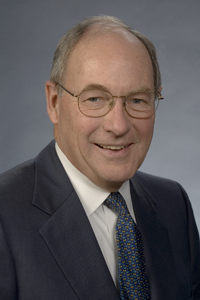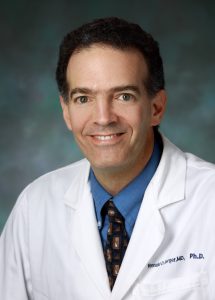 NICHOLAS J. FORTUIN, MD, interned at Johns Hopkins Osler Medical Service in 1965, then entered fellowship training in cardiovascular medicine under Richard Ross, conducting research involving new concepts in the distribution of blood flow in heart muscle. He was drafted into the U.S. Public Health Service, assigned to the University of North Carolina School of Medicine to conduct research on the effects of air pollution on the heart. While there he employed the new technique of ultrasound to study heart function. In 1971 he returned to Hopkins, rising through the faculty ranks to professor of medicine in 1986. During his early faculty years he developed the first laboratory of echocardiography at Johns Hopkins, and promoted the use of this important technique in clinical cardiology.
NICHOLAS J. FORTUIN, MD, interned at Johns Hopkins Osler Medical Service in 1965, then entered fellowship training in cardiovascular medicine under Richard Ross, conducting research involving new concepts in the distribution of blood flow in heart muscle. He was drafted into the U.S. Public Health Service, assigned to the University of North Carolina School of Medicine to conduct research on the effects of air pollution on the heart. While there he employed the new technique of ultrasound to study heart function. In 1971 he returned to Hopkins, rising through the faculty ranks to professor of medicine in 1986. During his early faculty years he developed the first laboratory of echocardiography at Johns Hopkins, and promoted the use of this important technique in clinical cardiology.
Dr. Fortuin’s commitment to medical education at all levels was a strong feature of his professional life at Johns Hopkins. With colleagues Thomas Traill and Lowell Maughan, he organized and ran the annual “Topics in Cardiovascular Medicine” course for practitioners from outside the institution. He served as a member of the board of trustees of The Johns Hopkins Hospital for over 20 years, and also was a member of the Johns Hopkins Medicine Board. He was president of the School of Nursing Board for a two-year period. Dr. Fortuin passed away in 2010.
Held by Ronald D. Berger
 RONALD D. BERGER, MD, PhD, received his BS, MS, and PhD degrees in Electrical Engineering from the Massachusetts Institute of Technology. In 1987, he earned his MD from Harvard Medical School. Continuing his education, he completed Medical residency at the Brigham & Women’s Hospital in Boston followed by Cardiology fellowship at Johns Hopkins Hospital in 1993. Dr. Berger has earned several professional appointments throughout his medical career, including Research Scientist at the Harvard-M.I.T. Division of Health Sciences and Technology, Professor of Medicine and Professor of Biomedical Engineering at Johns Hopkins University, and Director of the Cardiac Electrophysiology Fellowship Program and Co-Director of the Electrophysiology laboratory at Johns Hopkins Hospital. As Fellowship Director, he has trained over 60 fellows in Cardiac Electrophysiology.
RONALD D. BERGER, MD, PhD, received his BS, MS, and PhD degrees in Electrical Engineering from the Massachusetts Institute of Technology. In 1987, he earned his MD from Harvard Medical School. Continuing his education, he completed Medical residency at the Brigham & Women’s Hospital in Boston followed by Cardiology fellowship at Johns Hopkins Hospital in 1993. Dr. Berger has earned several professional appointments throughout his medical career, including Research Scientist at the Harvard-M.I.T. Division of Health Sciences and Technology, Professor of Medicine and Professor of Biomedical Engineering at Johns Hopkins University, and Director of the Cardiac Electrophysiology Fellowship Program and Co-Director of the Electrophysiology laboratory at Johns Hopkins Hospital. As Fellowship Director, he has trained over 60 fellows in Cardiac Electrophysiology.
Dr. Berger has made important contributions in several areas of investigation, applying signal processing and electrical engineering concepts to solve problems in arrhythmia diagnosis and management. He developed an electrocardiographic processing methodology to assess risk of life-threatening arrhythmias in patients with cardiomyopathies. He also developed a technology for ECG and chest compression analysis during cardiopulmonary resuscitation. Dr. Berger’s current research includes work on cardiac defibrillation, developing a novel scheme for termination of ventricular fibrillation without painful shocks. Each of these technologies has led to numerous publications as well as licensing arrangements facilitating tech transfer into clinical use. Dr. Berger has also investigated new technologies in implantable cardiac devices and catheter ablation. He has published over 270 papers in the medical literature and holds over 30 U.S. patents. Dr. Berger has received multiple awards for his research, including the Johns Hopkins Solo Cup Clinician Scientist Award, a FIRST Award from the NIH, an Established Investigator Award from the AHA, and an Abell Foundation Award for Research Translation.
 NICHOLAS J. FORTUIN, MD, interned at Johns Hopkins Osler Medical Service in 1965, then entered fellowship training in cardiovascular medicine under Richard Ross, conducting research involving new concepts in the distribution of blood flow in heart muscle. He was drafted into the U.S. Public Health Service, assigned to the University of North Carolina School of Medicine to conduct research on the effects of air pollution on the heart. While there he employed the new technique of ultrasound to study heart function. In 1971 he returned to Hopkins, rising through the faculty ranks to professor of medicine in 1986. During his early faculty years he developed the first laboratory of echocardiography at Johns Hopkins, and promoted the use of this important technique in clinical cardiology.
NICHOLAS J. FORTUIN, MD, interned at Johns Hopkins Osler Medical Service in 1965, then entered fellowship training in cardiovascular medicine under Richard Ross, conducting research involving new concepts in the distribution of blood flow in heart muscle. He was drafted into the U.S. Public Health Service, assigned to the University of North Carolina School of Medicine to conduct research on the effects of air pollution on the heart. While there he employed the new technique of ultrasound to study heart function. In 1971 he returned to Hopkins, rising through the faculty ranks to professor of medicine in 1986. During his early faculty years he developed the first laboratory of echocardiography at Johns Hopkins, and promoted the use of this important technique in clinical cardiology.